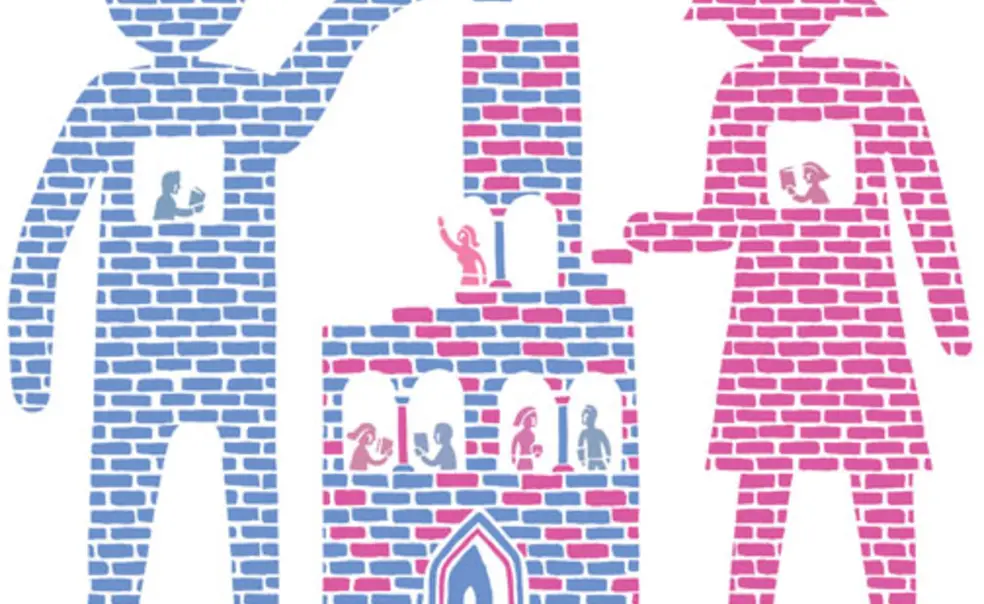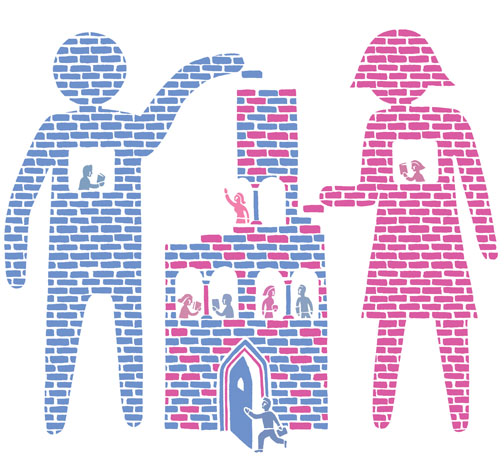Gender-neutral housing on its way
The days before coeducation at Princeton never have seemed farther away, with the University’s announcement last month that it will offer gender-neutral housing as a pilot program in 2010–11. Students are applauding the idea that, for the first time, undergraduates will be able to live with roommates of the opposite gender.
The program, drafted by the Undergraduate Life Council (ULC) and approved by the Council of Masters and Vice President for Campus Life Janet Dickerson, will allow male and female students to share suites in Spelman Halls. Upperclassmen in Spelman live in four-person suites with a separate bedroom for each student; the living room, kitchen, and bathroom are shared.
Many of Princeton’s peer institutions already have established gender-neutral housing options, which often have particular appeal for members of the Lesbian, Gay, Bisexual, and Transgender (LGBT) community who might feel more comfortable living with students of the opposite gender.
Connor Diemand-Yauman ’10, Undergraduate Student Government president, said the initial reaction from students had been “overwhelmingly positive.” Some said the issue is one of equity. “This is a positive step in terms of being accessible to folks who deal with gender unconventionally,” said Sarah Constantin ’10. Others said students, whether LGBT or heterosexual, will have more options. “We’re all adults,” said Robert McGibbon ’11. “It only helps people to give them more choices.”
But the program aroused some concerns as well. For room-draw groups of four to eight students to be eligible for gender-neutral housing in Spelman, at least half of the students must be independents. That requirement may discriminate against eating club members, said David Karp ’10. Matt Sanyour ’11 said he fears that mixed-gender housing groups might open the door for a drunken roommate to commit an assault.
Arthur Levy ’10, ULC chairman, said conservative students voiced a concern that the program endorses heterosexual couples living together before marriage. Brandon McGinley ’10, head of the pro-chastity Anscombe Society, said gender-neutral housing may “add to a culture of sexual expectation.”
Emily Rutherford ’12, who helped draft the proposal, said she doubts that heterosexual couples in a relationship will take advantage of the program, however. She said that most same-sex couples, who already have the option of living together, typically don’t, and heterosexual students probably would act similarly.













4 Responses
John A. Pfeifer ’54
10 Years AgoGender-neutral issues
Because of some temporary health problems, I was delayed in reading the March 17 issue of PAW. The experience almost gave me a fatal relapse. This was brought on by two totally conflicting decisions apparently made by people in positions of authority at Princeton.
The two issues were the mandatory program for all freshmen titled “Sex on a Saturday Night” and gender-neutral suites. For parents of students, the term “gender-neutral” means that your daughter can expect that when she is taking a shower (especially late on Saturday night), she should not be surprised if one or more young men wander into the bathroom stark naked, or if she is sitting on the toilet reading a book of Elizabethan poetry, more young men may decide to look her over from stem to stern. If she is really lucky, no uninvited males will enter her bedroom or her bed when she is there. These are reasons why young ladies and their parents do not yearn for gender-neutral living arrangements unless the lady is married.
What makes this decision so strange in my mind is that the mandatory sex program is (I hope) a rather lame effort to put the women at Princeton on guard about some of the things that may come up thanks to the gender-neutral policy, as well as the more serious kinds of things that usually arise when young women are forced into such situations at the age of 18 or 19, combined with alcohol or drugs or just the pressure of wanting to be accepted as one of the gang at a new environment at college — especially one founded as a seminary.
Sam Boatwright ’59
10 Years AgoSeeking moral integrity
I suppose the gender-neutral housing policy (On the Campus, Nov. 18) makes sense if one subscribes to the empty notion that this is an enlightened age in which there are no absolutes such as morality, ethics, God-given commandments, accountability, etc. If each man is his own god, then he can make the rules as to which actions he takes are right or wrong.
Is there an ethical stance of the administration and the trustees? Princeton was founded by men to teach others about God as well as to provide a college for liberal arts and sciences, where students would “behave themselves with Sobriety and Virtue.” PAW articles over the years have shown that sobriety for young adults has been a daunting challenge. Now that the current administration and trustees have allowed, perhaps even promoted, the gender-neutral housing policy, there is a distinct challenge to virtue. Surely the founders are revolving in their graves at an even greater clip.
I believe Princeton will suffer a decline in contributions. Who wants to contribute to an institution that puts stumbling blocks in the path of rising adults? You seem to pander to quasi-adult students and confused-gender students (LGBT) in the name of equality, non-discrimination, and political correctness. If alcohol is a problem for rising adults, what about cohabitation?
It is past time that Princeton return to moral leadership in the administration of its students. I suggest you seek wise counsel from Professor Robert George and (gasp) even from the Bible. God does not wink at any of our indiscretions. Even a laissez-faire attitude is like leaving the barn door open. It is wrong, and we are accountable for our actions. Perhaps students could be taught the ways of success to include God, honoring others, and moral integrity without putting social experiments in their way.
Rocky Semmes ’79
10 Years AgoCoed suites? Hold on
In regard to the new program proposed for coeducational student housing (On the Campus, Nov. 18), I take exception to the comment by Robert McGibbon ’11 that “We’re all adults. It only helps people to give them more choices.” The presumption that post-adolescents are indeed adults (whatever we mean by that term exactly) might be inaccurate, and recent studies suggest that Mr. McGibbon’s comment may not reflect actual circumstance.
Dr. Ruben C. Gur, neuropsychologist and director of the Brain Behavior Laboratory at the University of Pennsylvania, notes that “the evidence now is strong that the brain does not cease to mature until the early 20s in those relevant parts that govern impulsivity, judgment, planning for the future, foresight of consequences, and other characteristics that make people morally culpable ... Indeed, age 21 or 22 would be closer to the ‘biological’ age of maturity.”
Deborah Yurgelun-Todd of Harvard University Medical School’s Brain Imaging Laboratory says, “So (although) somebody looks physically mature, their brain in fact may not be mature.”
Even those whom we culturally acknowledge as completely mature adults are often capable of borderline behaviors (visit any local divorce court for those stories). So I question Mr. McGibbon’s assertion that “we are all adults.” Indeed, the truth is more than likely that some among us never completely get there at all. I am not passing judgment on this new housing initiative because, in Socratic ignorance, I admit that I only know what I don’t know. We can all hope for only harmless outcomes from this new initiative.
McKellar Maloney ’67
10 Years AgoRethink coed dorm plan
I note that the administration is planning to offer a pilot program in the fall of 2010 to allow coeducational dorm roommates. I care not if some 20-year-old undergraduates think it a swell idea or if other Ivy schools have blundered down this path. This is not an issue of freedom of choice. This is promotion of sexual license.
If it proceeds, here is my headline: In Span of Two Generations: In Loco Parentis to Non Compos Mentis.
Think again, Princeton.